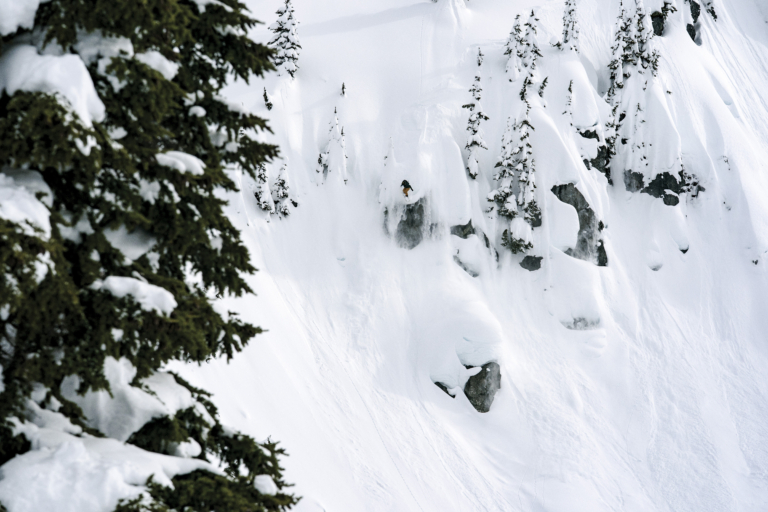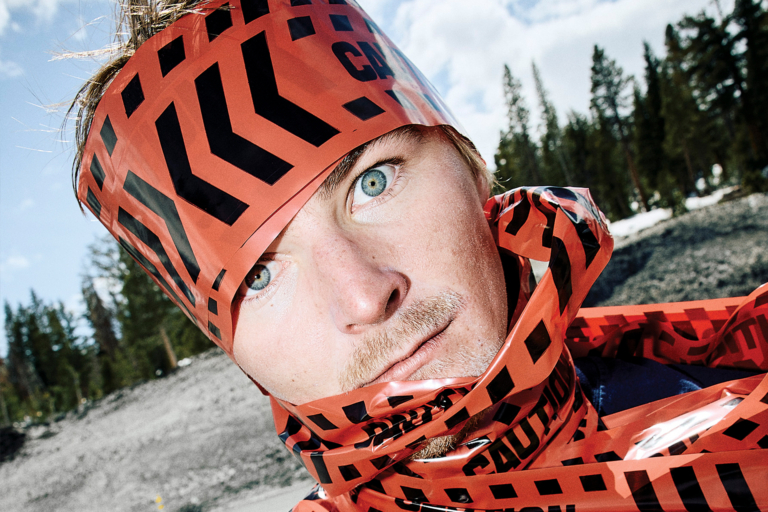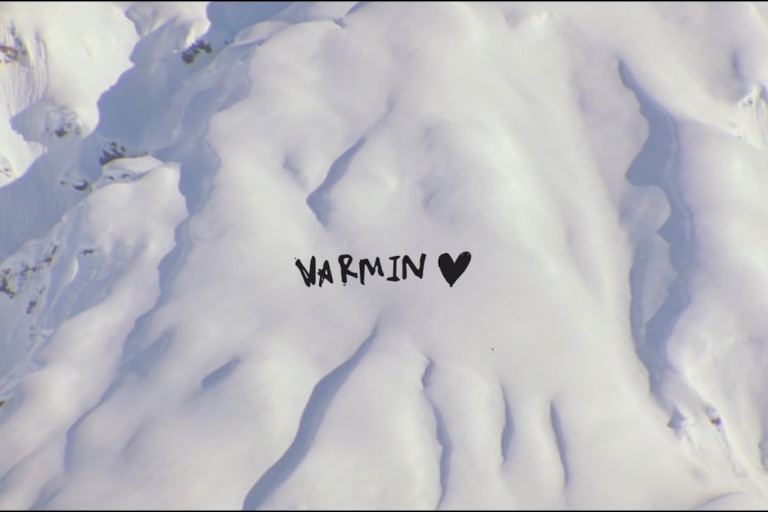Perspective: Nils Mindnich
This feature originally appeared in issue 19.2.
FEAR IS LIKE A VERY POWERFUL COMPASS THAT CONTRIBUTES TO A LOT OF THE DECISIONS THAT I MAKE WHEN I SPEND TIME OUTSIDE. When I’m in a backcountry scenario, whether that’s snowmobiling, splitboarding, hiking, or climbing in the summer, a lot of premeditated effort goes into what the experience is going to look like. I start with my physical ability and then once that is factored into the scenario, it’s fear. Am I physically strong enough to go up this mountain or to climb this route? And then the next thing is, Is it safe?
Although I’m 27, I almost have two decades of mileage spending time outside. When I was an adolescent, I liked fear and risk. I liked trying to see how I could manage being afraid, and that put me in situations and pulled me in directions that were inherently more dangerous. As I’ve matured, I’ve gotten a lot more psyched on things that are a bit more fun and where the consequences seem manageable. There’s an upper threshold of fear that I don’t really venture past now, but still end up finding sometimes. I guess where I am now, I’m more likely to think, Okay, if I fall here, will I be fine? and ideally, I always like the answer to that question to be, Yeah, you’ll probably be fine.”
I used to be a lot riskier and debatably, more of a badass when I was younger. Now, I’m much less of that and the change has occurred for a number of reasons. Up until I was 14 or 15, I was super afraid of even the most mundane things. I was afraid of scary movies. I was afraid of jumping into water off of a cliff that was over ten feet tall. And I would get really scared when I tried to push myself snowboarding, which was ironic, because when I was 15, I was pretty good for my age. But a lot of that skill was from all the mileage I’d already had, so I never really had to shock my system to get to that point.
And then, this may come across a little darker, but I entered this period of my life from probably 16 until 23 that I was…I wasn’t depressed, but I had a lot of demons I was grappling with, just turning into an adult. Maybe a lot of young people deal with this; your life’s changing and you get all these new perspectives on how the world works, who you are, and your expectations. I kind of had a turbulent mind and a really easy way for me to find therapeutic refuge was to explore the space of my physical and mental limits. Because it required so much presence, effort, and focus, it quieted down my mind.
From 17 to 23, I was really into free soloing. It was a pretty big part of my identity during that period and no one really knew about it. For people who free solo, it is a very personal thing. I still remember the first time that a friend brought me out soloing. I thought it was just a normal thing that climbers did; that’s how new to climbing I was. I really liked it. I loved how focused I was and how easy it was to be very present. It was super therapeutic for me. That whole world of free soloing doesn’t have the biggest margin for error and it built this mental capacity for me.
By the time I was probably 18, a lot of the situations I was encountering on a snowboard didn’t seem that bad. I could be in a crazy situation or want to try a trick, and I had this skillset that I could quickly categorize where the risk lied and then make a distinct decision of “is this actually fucked up or is this pretty reasonable to try?”
I was really proud of how I’d developed to manage risk and fear at this point; it had become a large part of who I was at that time. And then, I just started to phase out of it. For a while, going to this limit would quiet my mind, whether it was hiking a mountain as fast as I could, soloing something, or doing a huge challenge. I guess I was hitting all these limits, and then essentially it started having a reverse effect.
It got to a point that it wasn’t feeling therapeutic to push myself in a dangerous way. There are a couple factors that made that transition happen, and I think one of them is that I gave myself permission to feel like I’d proved myself. I spent more time reflecting that I’d hit the gnarly jumps at The Launch and Superpark. I’d soloed the things that I think are appropriate to solo. I had checked all these boxes and felt, Well, I don’t really need to push myself in this way to prove myself. I can grow in other areas that are more fun and sustainable.
I guess I just changed my approach to riding a little. Mentally, I chilled out a bit and got more confident with who I was and the decisions I wanted to make. I was in a committed relationship, I had stable sponsors, and I was finishing my college degree. Things were aligning, and with that comfort and stability, I think my risk reflected that. I could enjoy going for a walk with our dog and eating ice cream. Like, Holy shit. Who would have thought? I just felt more comfortable with who I was without having to do something dangerous to prove myself.
I still love to push myself, don’t get me wrong. The unity between trusting and moving my body is still how I like to calm my mind. But there was just a mental stillness that I grew into that allowed me to not have dangerous things be my outlet to calm down. There were also enough examples that very clearly laid out what high- risk activities can lead to. I mean, you spend enough time on social media following climbers, BASE jumpers, skiers, and snowboarders, and you see people die. There are plenty of people I followed on Instagram when I was 20 that were inspiring, and they’re tragically dead now. You get that exposure after doing it for long enough and it’s not this new, exciting thing anymore. You’re like, “Ah, fuck, it’s just actually too dangerous.”
I think it’s just a good example of risk versus reward for was for me. I mean, that’s kind of the interesting part about a lot of these sports, whether climbing, surfing, snowboarding or other mountain sports. There is inherent danger that you cannot avoid if you’re going to push yourself and you need to find that balance—which is where I’ve grown with my climbing and why it’s so fun. I can reach a complete physical and mental threshold and it’ll be is under a circumstance that when I fail— because it’s all I do when I climb, you’re just falling trying to learn—it’s safe because I’m on a rope or have pads below me. So I still get to still push that limit in a safer way. But snowboarding’s different.
For me to push my snowboarding, which I totally love to do and is super rewarding, it’s like, “Well, fuck, this really isn’t that safe at a certain point.” If I want to try a doublecork on a massive jump, I can do it a handful of times, but eventually, maybe the landing ices up or I could blow my knee. The conditions, the time, the circumstances—there are a lot of different factors that play a big role in how to manage the situation. How do I try to stay calm if and when things are kind of fucked?
I think the whole goal is to try to account for as many outcomes and as many factors as possible, right? “Okay, I want to hit this jump and try this trick. Well, if I cut too hard to the right or left, are there trees or rocks I would land on? Yes or no? If I go too deep, is the landing really long and is there good snow? Yes or no? If I go eighty feet instead of sixty, there’s still a bunch of landings and I won’t land in a field or something. Cool.” Essentially, I want to push the amount of control I have and up the risk a little. For me, before I get into a situation, I’m always in this analytic premeditated state of like, Well, what actually is happening and could happen? What do I want to happen? What will hopefully happen? I try to think through the scenario and all of the good and bad factors in order to have a pretty good roadmap, so there aren’t that many surprises when you decide to do the thing.
I think where the lines get blurred and mental fortitude and the special circumstances of what it’s like to be human come into play, when you have inherent fear of the thing in front of you. You could be snowboarding, climbing, or dealing with something in a relationship, a project, anything—fear comes up everywhere—but you have created this roadmap. And then what all of us have experienced at some point, is that your roadmap goes awry and your plan goes out the window. You start executing the thing, whether riding a gnarly line or hitting a big jump or engaging in this conversation, and something doesn’t go according to plan. In that instance, your fear will kick in and you either navigate through the situation, or your fear turns into panic. And when you panic, you don’t think clearly and odds are, you’re fucked.
I feel that in every facet of life. Whether it’s snowboarding or anything, managing that is different for everyone. For me, I built up a tolerance during that period of my youth when I spent a lot of time in situations where I couldn’t panic and it gave me a solid foundation to almost never panic now.
When I was younger, I found solace in getting close to being afraid. I’m still really rewarded by pursuing that, but now I’m more driven by the simplistic act of landing the trick, or being able to just observe cool tricks happen and observe the beautiful landscapes I’m spending time in. It’s a lot easier for me to take a step back and watch instead of wanting to try to take a step forward and push the limits. Part of it is that I’ve made this transition away from being driven to pursue the focus that high-risk situations require. I want to pursue more fulfilling situations that don’t necessarily require the same amount of risk, that still require a lot of hard work to get to but are just less dangerous. I’m drawn to situations that are more complex and nuanced way. I think I’ve just grown up in the last couple of years and my tastes have become a bit more refined in terms of the things that I think are healthy or unhealthy for me. And to make it through that change takes time and some luck. You just have to be self-aware. The analyzing aspect that I felt like I excelled at when snowboarding has now extended to self-reflective analysis. How do I feel? Why do I feel this way? Is that feeling rational? Just peeling back the onion and allowing myself to face my shadow.
But also it makes me think, Why do something risky at all? Personally, I think that answer is kind of easy: I get to be fulfilled and build confidence. I get to experience various emotions and then I get this dopamine release when success occurs— physically, mentally, and emotionally. I feel good when I can manage risk, push myself, and get to experience being human and being present.
Obviously, there’s a balance to all of it, right? And I think on a small scale, there’s always a fear of failure. There’s that fear which then comes with excitement about things that aren’t really dangerous, whether it’s, I don’t know, painting my house. Or, I find it a lot in climbing where I’m like, Do I have what it takes to eventually send this route? Fuck, am I wasting my time? Are people going to think I’m stupid for trying it because it looks like I’m just out of my league?
You just sort of manage all of these emotions and expectations. And eventually, ideally if you’re doing it right, you start to make small amounts of progress, and that’s where I can end up in this balance game where I’m like, Fuck, I might fail. It’s painful to fail because of X, Y, or Z. Because I’ve spent 200 hours training this fall and it might be a waste of time. That can be scary and it sucks.
I think that’s just how it is for everyone. No one likes to fail. Because as a society, you’re not supposed to fail. We highlight the successes and even if you know it’s okay to fail, it’s still scary. But you have to fail, which means that you’ll have to manage and address fear, whether it’s danger to your body or your ego, or your mental capacity to be smart enough or strong enough to then learn something.
And you hopefully start to see successes. You’re finding out new things and having new experiences. And all of a sudden, you still get that same sensation that you would get from snowboarding, which is that fear is almost a byproduct and just part of the equation when you want to enjoy learning. And learning is an inevitable part of the path that I find really fulfilling. Success and learning are kind of synonymous, I guess, in my world. Learning new things is a really awesome sensation that we are so fortunate to get to experience, so toss it in your life. It’s cool.
As told to Mary T. Walsh.






